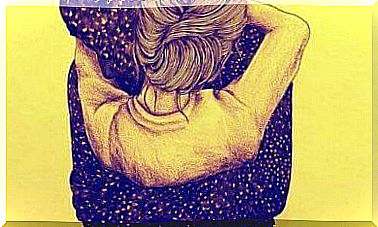Existential Depression: Life Loses Its Meaning

Existential depression is a little-known but recurring psychological condition. Some of the characteristics are a feeling that you are not living up to expectations, that life is meaningless, or that the world is unfair, full of injustice and infinite inequalities.
This term may sound strange to you and even reckless from a clinical point of view. It’s true that it’s not in the DSM-V ( Diagnostic and Statistical Manual of Mental Disorders ) and also that you probably don’t know anyone who has been diagnosed with it.
However, we should note that it is a common mental illness and some people suffer from it.
The History of Existential Depression
In 2012, Dr. Robert Seubert published a research article in the Journal of the European Psychiatric Association to highlight an important fact.
He says that part of our society is not responding to normal depression treatments, and this can be related to personality types and even high intellectual abilities.
Some people navigate other psychic universes, where they ask themselves deeper questions and feel a kind of unusual suffering. Feeling anxious about the future of the world, or being sad because you can’t find the real meaning of life, can lead to a very specific form of depression.

Existential Depression: Definition, Symptoms and Causes
It is possible that this kind of depression takes us back to authors such as Søren Kierkegaard or Friedrich Nietzsche. They talked about the principles of freedom and individual or personal responsibility, human loneliness and that very classic concept of existential anxiety.
The latter term refers to fear of the future, the importance of our decisions, and the fear of not becoming what you expect. But what does all this have to do with existential depression itself?
Quite a lot actually. One of the individuals who has most studied this psychological condition is Irvin David Yalom, psychotherapist and emiritus professor of psychiatry at Stanford University. One of his most notable works is the book Existential Psychotherapy .
In it he tells about the most important characteristics that a patient with this type of depression exhibits. As you will see, it is quite similar to the ideas most of the representative divisions of existentialism in philosophy conveyed in the past.
What are the symptoms of existential depression?
All types of depression are multidimensional and complex phenomena. Every person experiences depression in a different way and in general it is usually related to other conditions, such as anxiety. This kind of reality has very special characteristics, such as:
- Lack of meaning. The person in question finds no meaning in his or her existence. It feels as if they are moving in a void where nothing is transcendent, authentic or enriching to the mind.
- Feeling that others do not understand them. It is when, in addition to loneliness, they also feel like a stranger in the world.
- Not achieving personal fulfillment. Society is limited as there are no mechanisms to promote creative, professional, human and societal growth.
- Suffering from social injustice. This is because of injustice and lack of freedom.
- Talking about death often. Thoughts on the ephemerality of man.
- Thoughts of suicide are also common in this type of mental disorder.
- Physical manifestations. Think for example of exhaustion, insomnia, hypersomnia and eating disorders.
A common form of depression in people with high intellectual abilities
Existential depression is integrated into a theory developed by psychiatrist Kazimierz Dabrowski (1902-1980). This approach is called positive disintegration. It is based on the following explanation:
- Humans can go through five stages of development.
- However, about 70% of the population does not progress beyond the first three stages. It is a development through which people get used to the guidelines of society, until they gradually find their place in it and adapt.
- 30%, on the other hand, reach the peak of personal development. But far from eliciting more wisdom or well-being, it leads them into existential crises. They don’t feel part of what society expects of them. This is what Dr. Dabrowski called “positive disintegration.” In other words, whoever reaches that level is obliged to reformulate, disintegrate, and rebuild himself.
- However, it is common for them to doubt themselves, feel tormented and find meaning in nothing around them for a while.
- This kind of suffering is common among people with high IQs, as these people most often suffer from existential depression.

Therapeutic Strategies
Can We Treat Existential Depression? Like any other type of mood disorder, this condition is also treatable. In general, it is important to individualize the therapeutic strategy and take into account the needs of each patient.
In addition to psychological therapy, some patients may also benefit from pharmacological treatment (antidepressants). But how can someone with high intellectual capacities who is suffering from depression be helped?
- Cognitive behavioral therapy is a very good strategy (Spanish link). It helps them steer those thoughts towards a more positive approach so that they can find new meaning in life. It also helps them set goals that they can achieve, meaning they will get excited about the future again.
- Emotional management needs to be worked on to reduce the impact of the most negative or complicated emotions. The goal is to ensure that the patient continues to develop without the burden of fear and negativity.
- Acceptance and Commitment Therapy (ACT). This kind of approach enables patients to understand that the world isn’t always the way they want it to be. Therefore, we must all accept uncertainty, contradiction and injustice, without allowing suffering to destroy us. Instead, we must commit to a set of values and goals.
We need to tackle existential depression
In short, while we don’t find existential depression in diagnostic manuals, there are effective treatments and strategies to maintain the well-being of those who suffer from it.
While this may make it difficult for a patient to see a doctor, their feelings about the world around them will prompt them to seek help.









